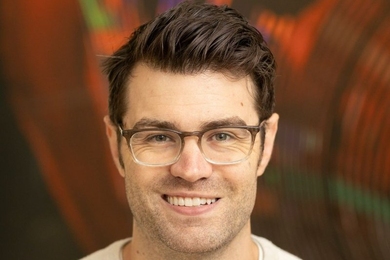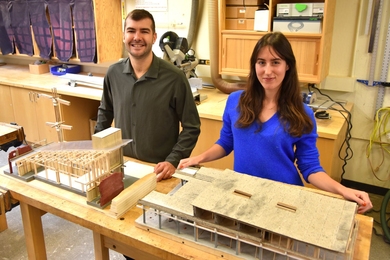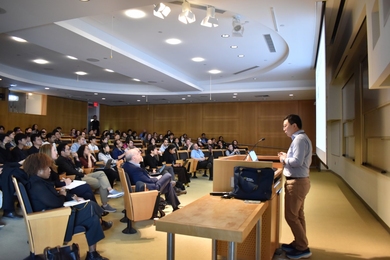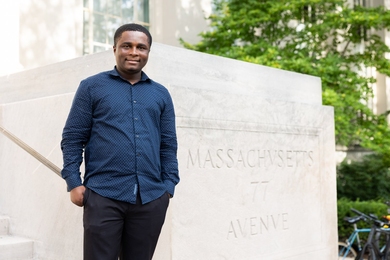Gene M. Brown, MIT professor emeritus of biology, former department head, and former dean of the School of Science, passed away on Aug. 4 at the age of 91.
“He was really the heart and soul of the department for a very long time, devoted to undergraduates and to teaching,” says MIT Professor Lisa Steiner. Steiner, an expert in the evolution and development of the immune system, was hosted by Brown during her recruitment visit to MIT and became the first female faculty member hired in the Department of Biology. “The idea of the department without him is quite shocking.”
A pioneer in the field of intermediary metabolism, Brown’s research career focused on how living systems carry out chemical reactions in order to survive. He trained himself in enzymology after arriving at MIT, and he and his students and postdocs focused primarily on the enzymatic synthesis of several B vitamins, including thiamine, folic acid, riboflavin, and coenzyme A. He is best known for his work on the biosynthesis of folic acid and related compounds both in microorganisms and in the fruit fly Drosophila melanogaster, publishing over 100 research papers in his career.
“Gene was a wonderful research advisor and teacher,” says Linda Spremulli, professor emerita of chemistry at the University of North Carolina at Chapel Hill, who was a graduate student with Brown from 1969 to 1973. “He transformed my life, instilling in me a love for the beauty of metabolic pathways with their complex mechanisms.”
Growing up in rural Missouri and Idaho, Brown was the first member of his family to finish high school, and the only person in his graduating class to attend college. After a year as a college student in Idaho, Brown enlisted in the Army Air Forces, where he taught defensive measures against chemical warfare. After his term in the Army Air Forces, he returned to college at Colorado A & M College, where he majored in chemistry, graduating in 1949. He completed his graduate work at the University of Wisconsin in 1953 under the direction of Esmond Snell, isolating and characterizing the enzymatic synthesis of pantetheine, an analog of vitamin B5, and an intermediary in the production of coenzyme A.
Brown continued working with Snell as a postdoc at the University of Texas until he was recruited by Professor Jack Buchanan to join the newly forming biochemistry division of the MIT Department of Biology in 1954. Brown served as executive officer of the department from 1967 to 1972; as associate department head under Professor Boris Magasanik from 1972 to 1977; as department head from 1977 to 1985; and as dean of the School of Science from 1985 to 1991. While serving as dean of science, Brown closed his research program. He officially retired from MIT in 1996, but continued teaching until 2014.
Brown’s deepest passion was teaching. “As dean, he would leave meetings with the president of MIT to go teach,” recalls Professor Tom RajBhandary, who co-taught 7.05 (Introductory Biochemistry) with Brown for over 20 years. He was legendary for teaching intermediary metabolism without any notes, filling the boards of Room 10-250 with detailed pathways in meticulous handwriting. Brown got his first taste of teaching in high school, when his math and chemistry teachers would routinely call him to the board to explain the material. He was the first person in the Department of Biology to give open book and open note examinations, promoting the view that students should not have to memorize, but rather should be assessed for their ability to think and to solve problems. He was involved in teaching 7.05 for 60 years.
“I loved teaching with Gene and will miss him,” says Professor Matthew vander Heiden, who currently teaches 7.05. “The privilege to see how he taught the class has had a tremendous impact on my own approach to teaching. I think he would be pleased to know that the unique insights he provided continue to be passed on each spring, and will continue to be passed on as long as I am involved in the course.”
Teaching undergraduates was a value that extended throughout his career. As dean of science, he made it clear that the quality of teaching would be an important consideration for tenure decisions. He also co-chaired the committee that instituted the undergraduate communications requirement aimed at improving skills in both written and oral communications. The Department of Biology gives two teaching awards in his honor: The Gene Brown Prize, funded by Brown himself, recognizes teaching excellence among undergraduates; and the Gene Brown-Merck Teaching Award, funded by Merck and by Brown’s former graduate students and postdocs, recognizes teaching excellence among graduate students.
During Brown’s administrative tenure in biology, the MIT Center for Cancer Research (the predecessor of the Koch Institute for Integrative Cancer Research) and the Whitehead Institute were established with Department of Biology faculty leadership (Professor Salvador Luria for the Center for Cancer Research in 1974, and Professor David Baltimore for the Whitehead Institute in 1982).
A longtime resident of Concord, Massachusetts, Brown is survived by his children, James, Lindsey, and Holly, and his four grandchildren. He was predeceased by his wife, Shirley, and a brother, James.
Gifts in Brown’s name may be made to the Gene Brown Undergraduate Education Fund, fund No. 3839399. Donations in his memory will support undergraduates and undergraduate education in the MIT Department of Biology. For more information, contact Rebecca Chamberlain at 617-253-4729 or rchambe@mit.edu.








